Ready to Turn Over Evolution to Robots? Transhumanists are Planning on it
“I’m going to need to expand…I need more power." Imagine a “point in time” when computers, in the form of robots, are deemed so much smarter than natural born humans that we are called to turn over the world to them.

Video clip courtesy of the revelatory documentary Take Back Your Power
Imagine a “point in time” when computers, in the form of robots, are deemed so much smarter than natural born humans that we are called to turn over the world to them. This fateful transition from human to robot is called Transhumanism, or the Singularity. It was introduced into the mainstream by Silicon Valley entrepreneur Ray Kurzweil in his recent book The Singularity is Near (paid link) and is now the subject of an important film called Transcendence, starring Johnny Depp.*
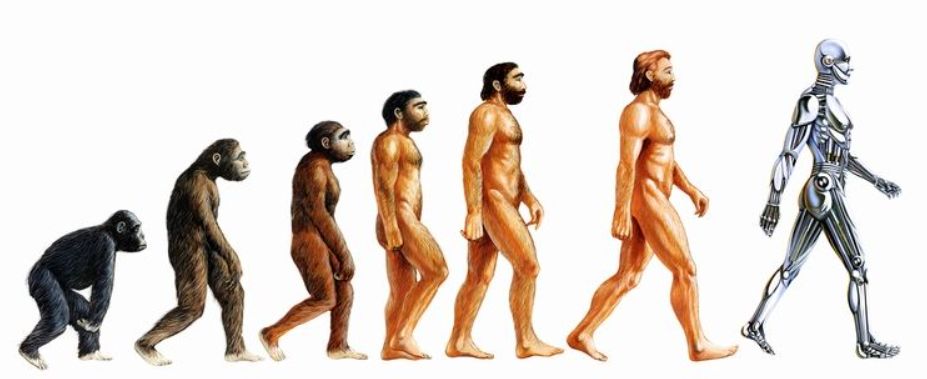
Transhumanists believe that what we experience as consciousness has nothing to do with a soul, but is actually just a result of synaptic impulses. So, they reason, since robots can calculate so much faster and better than humans, we would be better off turning over not just our world, but the evolution of our species, to the machines. Imagine, instead of dying, you’d be cloning yourself, or designing your perfect next self, and living as long as you wish. This geo-engineered iteration of you would be part of a race of robots who would actually determine what is best for the planet and all its species.
Sound like science fiction? What’s especially remarkable is how far-along, widespread and well funded this notion actually is. Fasten your seatbelts.
Transhumanist proponent Ray Kurzweil is currently Google’s Director of Engineering, and under his watch Google has purchased Boston Dynamics, makers of autonomous military robots, including humanoid robots. This is one of eight significant robotics companies that Google has acquired in the last 18 months, which also include drones and the London-based artificial intelligence firm Deepmind. Given Google’s financial resources, its relation to the NSA, and its access to people’s personal data, Kurzweil’s position is not one to take lightly. (See video clip at the top of this blog.)
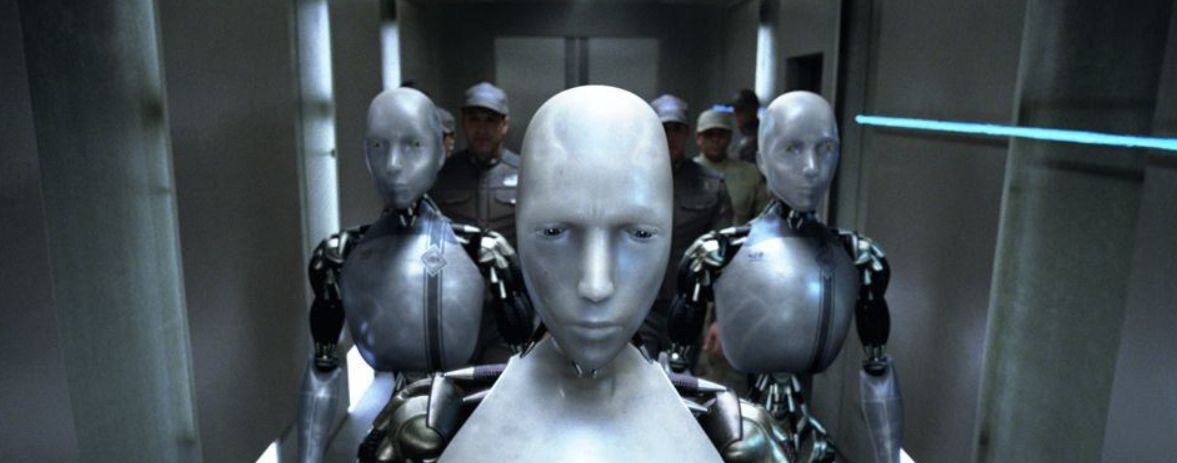
Ted Chu, another proponent, comes from a career as an economist with the World Bank, General Motors and the Abu Dhabi sovereign wealth fund. We were invited to meet with Ted Chu recently to discuss his new book, Human Purpose and Transhuman Potential (paid link). Our worldviews are very different, and we were grateful to meet in a spirit of respectful dialogue — a process that is both a challenge and an opportunity. Disagreeing is simply no reason to disengage. In fact, it warrants an increased capacity to listen and reflect. And so we did. In this regard, the process of the encounter was inspiring, even as what we heard was, for us, cause for great alarm.
As described by the Journal of Experimental and Theoretical Artificial Intelligence, autonomous systems, which are the robots into whose hands human evolution would be entrusted, are those for which the designer has not predetermined the responses to every condition. This means they are capable of “surprising their designers in unexpected ways”. Just what kind of unexpected ways?
These robots are programmed to be rational, and as such, are driven toward self-protection, resource acquisition, replication and efficiency — all rational behaviors. That means that once programmed, if they sense a threat to any of these behaviors they will do whatever is necessary to avoid being curtailed. Given that they are autonomous, that is, not able to be programmed for all eventualities, we cannot count on being able to stop, or “unplug” them. This is Frankenstein on global steroids.
Add to that the fact that each country wants to deploy technological creations, such as “super soldiers,” before their adversary and we find ourselves in a kind of arms race that most people don’t even know is happening. The military and economic pressures for rapid decision-making are at an all time high, and rising. Economic transactions are an indication: In 2006, 15% of trades were placed by HFT (computer-generated high frequency trading) but they now represent over 70% of the trades on the US markets. This technology (60 Minutes report) has facilitated the takeover and rigging of most major financial markets (paid link). (Flash Boys, by Michael Lewis)
We are big believers in the value of advanced technologies and look to them to augment healing, to expand our capabilities, to help relieve people of unnecessary drudgery, and to connect people across the planet and even throughout the cosmos. But that’s not what is happening here.
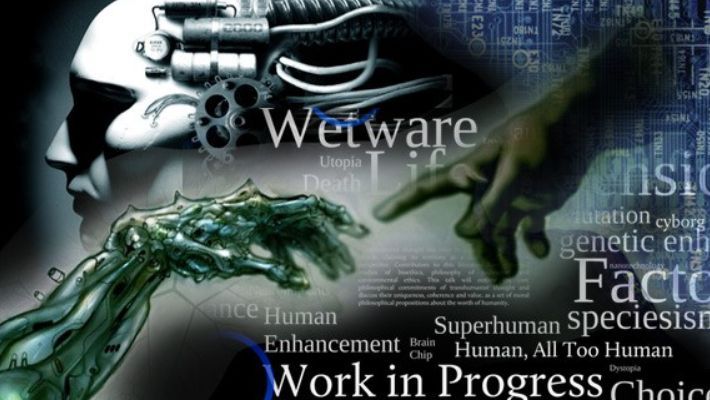
Instead, we are talking about a complete forfeiting of human evolution, an ultimate form of eugenics and an entirely new level of social engineering financed and developed by people who believe that calculation can replace love and that consciousness is a mere material construct.
We believe Transhumanism is further justification for the self-anointed “illuminated ones” — the more powerful, the wealthier, the “social engineers,” the Transhumanist visionaries or any other group of individuals who consider themselves above “the masses” — to make decisions that end up coercing others — to ingest nanobots, be chipped, surveilled, and submit to rule by cyborg. No matter the “grand vision” nor how many people agree with the vision, no one should be able to force any of these things onto anyone else.
According to Chu, this move to hand off human evolution to artificial intelligence frees us from our “genetic limitations.” In this vision, you won’t even need to stop to eat. He says, “it becomes possible to turbocharge our hedonic indulgences with genetic engineering…” That pesky desire for food, sex and procreation, gone! Oh, and “… it also becomes possible to pull the plug on the instinctive drives altogether.” We rely on our instincts, for intuition, empathy, psychic knowing, and so much more. Replacing them with mere logic circuits is not our idea of a wise way to go.
We nonetheless find it fascinating to fantasize about the infinite possibilities as to how capable the bots and borgs of the future can become. By definition, we can hardly imagine them…But what most interests us is the as-yet-untapped human potential to awaken in alignment with nature, not in spite of it. The rapid and well funded rise in Transhumanist technology represents a new call to action: human evolution will now have to take a step forward in our conscious evolution in light of the new technology that is poised to replace it.
Neither of us ever wants to turn over ethical decisions to a computer. We don’t want to have to get implanted chips, to be tracked, to have our brains linked to the grid against our will or to have nanobots circulating in our bloodstream involuntarily. If we turn over decision-making to machines that have tremendous calculating prowess and factual knowledge, but no real empathy, intuition, emotional intelligence or connection to the field of cosmic consciousness, the results, by all logic, will sooner or later be disastrous.
We will be not only giving up our own power to choose, but abandoning our own inner evolutionary imperative to master what it would mean to be fully human — able to align harmoniously with our physical, emotional, mental and subtle energy flows, able to live and collaborate with other beings, species and our natural environment without violation.
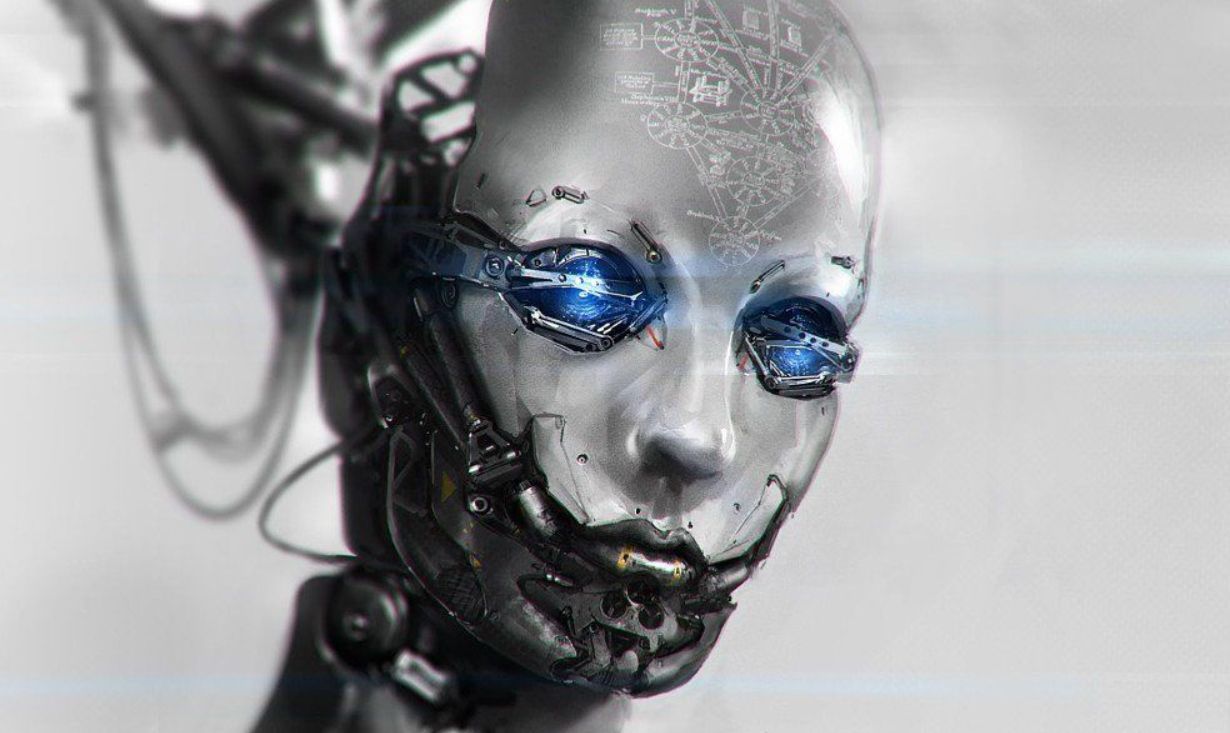
The maturing of the species has to be earned and learned. If we try to bypass it, we can anticipate disastrous outcomes that have only been glimpsed in Hiroshima, GMOs, chemtrails, pesticides, addictive and lethal pharmaceuticals, the HAARP array, and many other examples where ignorant, greedy or psychopathic behavior is joined with advanced technology to inadvertently or covertly destroy life.
We can do better than this. And now is our time to prove it.
Below are quotes from Chu’s book Human Purpose and Transhuman Potential and our commentary, addressing questions like:
- Is consciousness truly just an emergent property of complex molecules or is it instead actually senior to our physical selves?
- What about compassion, intuition, access to multiple dimensions, and love?
- Who would be in charge of determining what gets programmed?
- And what happens to those of us who don’t want to participate in this uber-logic, extreme reductionist state of materialist hubris?
We offer the following critique with appreciation for Chu’s willingness to meet and discuss our differences respectfully, and for his articulating the vision in an accessible way that serves to facilitate this critical conversation, and the necessary creative, ethical responses.
Major Concerns
(Numbers are book page references. The author’s quotes are in italics. Our notes are in standard text.)
Our Current State
“…the development of a strong and democratic state combined with a market economy that is built on the rule of law and private property rights. That goal was largely achieved.” (page 7)
“…human history can be characterized as an ongoing struggle to achieve economic and political freedom and to eliminate organized tyranny. Now that these goals have been largely achieved in the developed word, I believe we are ready to fight for transcendental freedom from the genetic tyranny that natural history has imposed on us.” (page 10)
Saying that these goals were largely achieved seems drastically inaccurate if not dangerously naïve. The state is not and never was truly democratic. In the US we are on the verge of a totalitarian police state. The government is run by the corporations (as made clear with Citizens United) and the corporations are controlled by the major national and international banks. The “rule of law” has become a myth perpetrated by the elite so they can control others while exempting themselves.
To propose that we are living in a world where economic and political freedom has been achieved and organized tyranny has been eliminated is utterly inaccurate. And this is the understanding Chu intends to program into these robots?
Market Capitalism
“When Market Capitalism hit its low point during the great Depression…” (page 303)
Our research indicates that the Federal Reserve was used by the elite bankers to create the great depression. What Chu calls Market Capitalism is at best a distant sociopathic, lying, cheating, stealing, state-intervention, centralized control anti-cousin of a true free market, and it’s gotten worse ever since. That’s why the 1913 dollar is worth less than three cents now and the US Treasury and the big banks Chu invested in from Abu Dhabi have trillions of dollars in derivatives debt.
Free Speech and Nuclear Technology
“Just like free speech and nuclear technologies, the right approach is not outright ban but controlled application to take full advantage while limiting potential downside risks.” (page 297)
Nuclear power and weapons are the single most dangerous and immoral creation of humanity so far. The Fukushima meltdown alone could contaminate the entire Northern Hemisphere and we have, as a species, been within minutes of an accidental or intentional nuclear holocaust that could destroy most life as we know it on Earth. To approach all of this as just needing “controlled application” demonstrates a lack of either information or wisdom concerning the risks of nuclear radiation and Transhumanism.
And exactly what parts of Free Speech does Chu want to control? And who gets to be in charge of the controlling? This book is riddled with indications of a coercive, top-down, elitist approach to the integration of advanced technology into human civilization and our natural environment.
Risks with Robots
“Beyond a certain point, autonomous robots will have to evolve on their own… An advanced autonomous robot that can truly stand on its own will be so complex that its behaviors will be unpredictable — with all the awesome consequences that implies for the future of the planet and for the universe.” (page 359)
Awesome consequences? If humans turn over our evolution to advanced computers, as Chu and Kurzweil recommend, then we run the obvious risk of their “calculating” that for their own protection, humans need to be eliminated or at least subjugated so that we don’t interfere with their presumed superior plan. After all, if we disagree with their plans, we would become a perceived threat to the continuation of their own survival.
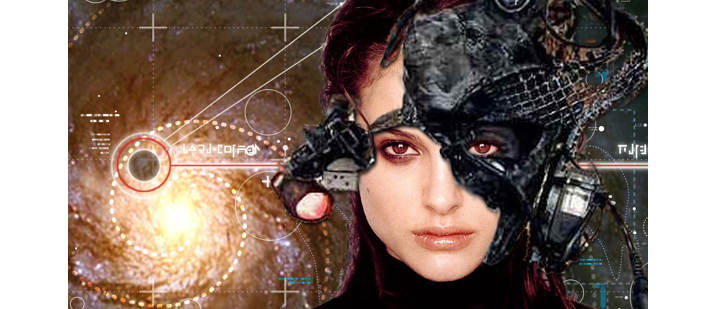
Combining Dangerous Technology With the “Politically Aggregated” Power of the “State” Threatens the Whole World. It Leads to Mandatory, Covert or Accidental Destruction of Our Health, Our Freedoms and Our Lives
Control Over Others
“The 1st order of business in terms of protecting creativity is the distribution of real estate.
The 2nd … is granting privileges to the talented and motivated.
The 3rd … is the controlled allowance of behaviors that might be inappropriate or dangerous under certain circumstances…
The 4th … is the occasional ‘pardon’ of the less fit.” (page 254)
Who is doing all of this “distributing…granting…allowing and pardoning?” Who should ever have that kind of power?
“Let the winner rule…while keeping natural barriers in place to maintain diversity…” (page 262)
What determines winning? Exactly what natural barriers? And why should anyone “rule?”
Against the Precautionary Principle
“Given potential dangers, shall we withhold new technologies until they have been proven to be absolutely safe and harmless?
“The Precautionary Principle is psychologically comforting, but it is more wishful thinking than a practical approach… History is made up of countless acts that had potentially world-ending consequences.” (page 304)
The Precautionary Principle, widespread in Europe but mostly resisted by the corporate and government powers in the United States, is the idea that companies and individuals who introduce new substances, chemicals, activities etc. should be responsible for making sure that they are safe rather than those impacted having to prove that they are dangerous.
Chu describes the Precautionary Principle as just a cumbersome limitation on important progress, that need not be honored, despite the risks of violating others.
Proactionary Principle
“… we can become technically adept not by waiting but by active trial and error. Our wisdom evolves as technology improves, and our instinctive moral sense cannot get an upgrade until we alter human nature.
“I believe the best mindset is the Proactionary Principle which follow Mao Zedong’s principle of being strategically fearless, tactically paying full attention.” (page 306/308)
It is alarming that Chu looks to people like Chairman Mao for guidance and justification for potential harm. Remember that 70 million of his own citizens were murdered by Mao’s vision.
Morality
“When human nature gets ‘upgraded’ or expanded to include higher perspectives and greater wisdom, traditional teachings of morality must also evolve and adapt to new reality.” (page 295)
What if the core morality we are seeking is simple and present already? If we realize and act according to the Non-Aggression Principle right now — and prosecute those who don’t (no hiding behind corporate liability protection clauses) — we could be guided by non-violation all along the path of technological development and distribution.
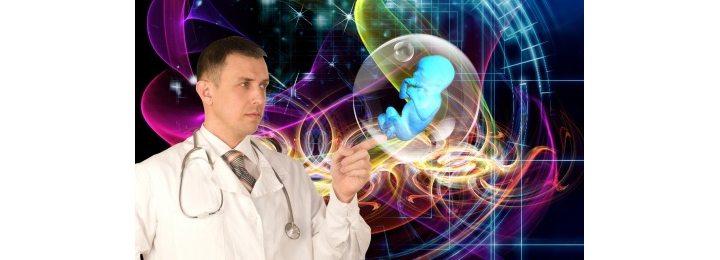
Kurzweil
Both Chu and Kurzweil seem to share 1) a lack of awareness of our growing police state, 2) a lack of clarity about individual rights, and 3) a driving fear of the natural process of dying — combined with ignorance of the role of the metaphysical in nature.
Ray Kurzweil acknowledges that his primary regret in life is not being able to invent a technology that could have prevented his father’s death, and his main goal is to “bring his father back.” He also describes a recurring dream where he is wandering alone in a cold dark house of empty rooms, and that this feels like death to him. No wonder his focus is on trying to obsolete the natural cycle of life and death by 2029 (his projected date for the turning over of human evolution to the computers…and the end of his estimated lifespan).
Consciousness as Primary
In The Singularity is Near, Kurzweil writes:
“Within several decades information-based technologies will encompass all human knowledge and proficiency…including the emotional and moral intelligence of the human brain itself.” (page 8)
This seems to be ignoring the soul’s access to cosmic consciousness and the core moral principle of non-aggression itself.
“Death is bad for the individual, but it leaves necessary room for successors, room for change. With new capabilities to self-transform in continuous evolution, however the successor can be oneself.” (page 364)
“We will gain power over our fates. Our mortality will be in our own hands. We will be able to live as long as we want.” (page 9)
If our body is made up of trillions of cells, which are made up of molecules, which are made up of atoms, which are 99% pure energy punctuated by so-called “particles” — which seem to be just whirlpools in the energetic sea…then there is no actual “thing” there. So what is organizing all those zillions of vortices that you call “you,” especially if all the cells have been replaced in the last seven years, yet “you” have remained all along?
Mustn’t the organizing entity then, by definition, be “beyond the physical?”
Assessing computers that can calculate billions of times faster than an organic brain as being more “intelligent” than we could ever be is a potentially disastrous misunderstanding of the difference between brain and mind, between calculation and consciousness, between mechanism and “monad” — that spark of consciousness that seems to remain and grow throughout the evolution of form and consciousness. Intuition, love, access to the “Akashic Records” or field of cosmic awareness, inter-dimensional channeling, telepathy, inner guidance — all of this is part of the opportunity of being human, yet not of the computers Chu and Kurzweil deem so superior to ourselves that we should subjugate the fulfillment of human evolution to them.
To his credit, when we shared these reflections on the convergence of science and spirit, Ted Chu acknowledged it was something that seemed important that he would look into.
Might It Be Unwise, Dangerous, and Even Lethal, to Try to Transcend Being Human When We Have Not Even Mastered the Evolutionary Art of Being Fully Human? (Such a Proposition Might Look Quite different Then!)
(Citations below are again from Human Purpose and Transhuman Potential.)
Leaping Beyond humanity vs. fulfilling humanity
“From the cosmic perspective, the potential reality beyond humanity must suddenly become our central concern.” (page 386)
By “fully human,” we are referring to attaining the wisdom and skills to live in a way that is healthy in body, mind and spirit, harmonious in relationship, prosperous in harmony with nature on this planet and throughout the cosmos.
There is ample evidence that the freedom we need to become fully human will never be intentionally allowed by those running the system that currently enslaves us.
Where we Agree
Freedom works better than Coercion
“The principal lesson we should draw from the earlier eugenics movement is not that it’s seemingly lofty goals inflicted great human misery (although they certainly did), but rather the evolutionary principle that freedom works better than coercion.” (page 304)
Freedom vs. totalitarianism
“There is no such thing as left or right, only up or down: up to humanity’s ultimate dream, realized in individual freedom consistent with law and order, or down to the ant heap of totalitarianism and stagnation.” (page 400)
It’s encouraging that Chu recognizes that the “right/left” polarity is an illusion of choice, both representing totalitarian thuggery. And it was thrilling to see that he could recognize that we could transcend “the state” altogether.
Here is the Thrive version of rising above the political polarity that is based on coercion — into the realm of voluntary action that does no harm:
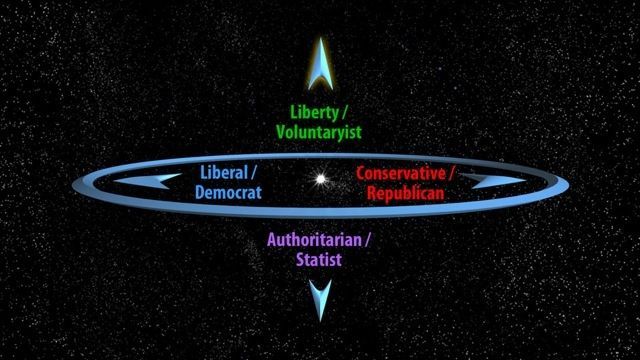
Politics — non-aggression
“Traditional government, the territorial monopolistic agency of legitimized coercion, may eventually disappear altogether.
“Although it has been done over and over, it has never in human history proven necessary to impose one’s ideas on others at gunpoint. In the future, wars between political organizations could become not only improbable, but also inconceivable as the standard of moral sentiments and the power of destruction both grow exponentially.” (page 377-383)
Given Chu’s background and prior allegiances, we were delightfully surprised to find a warning against a “one-world” government.
No world Government
“We should despair, however, if personal freedom and the freedom to experiment with a variety of social organizations are taken away by a global political entity. While global integration in many areas continues to deepen, it is a blessing that no centralized ‘world government’ is on the horizon.” (page 394)
We are relieved that Chu doesn’t seem to think that a “global political entity” is a good idea, but does he really not sense one “on the horizon?” In the book and in our personal conversations Chu seemed dangerously unaware of the Agenda for Global Domination. Advocating technologies that take over for humans, in an era when a powerful few are trying to take over humanity, carries extreme danger for most individuals and for life as we know it.
A Tru Solution — A Universal Morality
What about “human morality” or ethics? Voluntaryist philosopher Stefan Molyneux suggests:
“The greatest fight in the history of the world
and the world of ideas
is the fight to establish
a universal morality.”
The only serious candidate we see for such a universal compass — a true North — is the Non-Aggression Principle. Fortunately it is also the only thing we have found that everyone we ask agrees with — at least for themselves. No one wants to be violated against their will.
We Will Never Stop Developing More Advanced Technology, so Is There a Just and Sustainable Alternative to the Dangers of Transhumanism?
We believe it is absolutely critical, if humanity is going to survive, much less thrive, that we fully align with the Non-Aggression Principle. This will lead beyond the authoritarian state, include the Precautionary Principle, honor informed consent, and require personal accountability backed up by prosecution and restitution.
In our interactions with Chu, we kept bringing the conversation back to the fundamental question of “Will Transhumanism always be voluntary?” He finally said, “What is this obsession you have with freedom?” Freedom for us is not some bothersome obsession. It is our core commitment — for which we are obviously willing to risk our lives, as countless others fortunately have in the past.
It’s in the commitment we each make to freedom, for each and every individual — from coercion by bullies, tyrants, governments, corporations, ETs, cyborgs, robots or anything else — that the true fate of humanity lies.
Reflections on the movie Transcendence
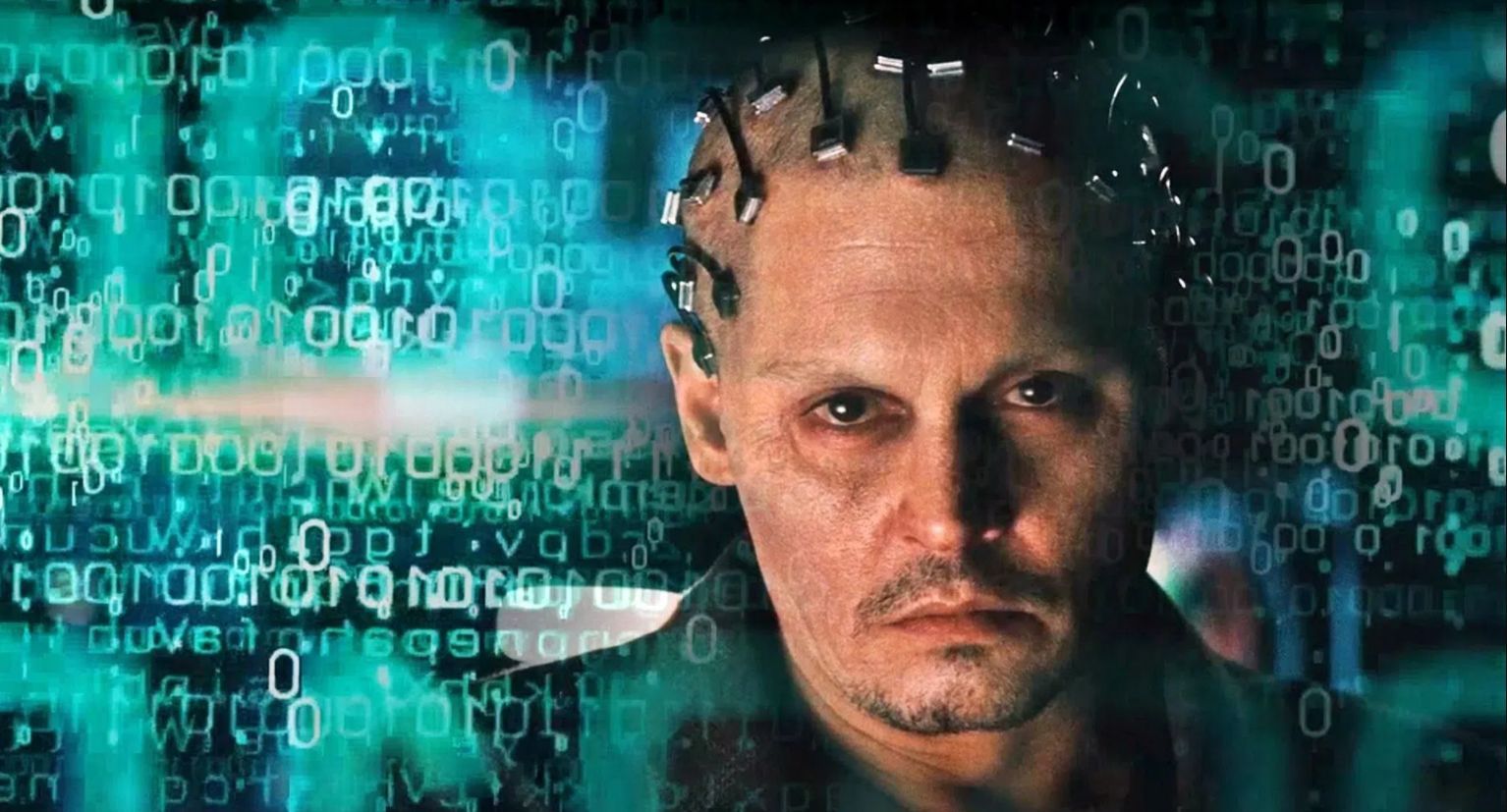
The new film Transcendence starring Johnny Depp does a remarkably skillful and even-handed job of exploring the benefits and risks of the emerging Transhumanist drive, while remaining an entertaining human drama. In exploring the “unavoidable collision of mankind and technology” the virtues of advanced AI are extolled — saving lives, healing the planet, restoring the environment.
Depp’s eccentric genius character sums it up: “They’ll be scared at first, but once they see what the tech can do, I think they will embrace it.”
But red flags start waving when the master device starts sounding like an authoritarian state, saying, “I’m going to need to expand…I need more power.” The computer, PINN — for Physically Independent Neural Networks — when asked if it can prove it is self-aware avoids the question, countering to its makers, “Can you?” One of the characters comments, as PINN starts taking over grids and filling the sky with nanobots that are changing everything, “This will be the end of primitive, organic life. Everything will exist just to serve its intelligence.”
(Spoiler Alert!) Morgan Freeman’s “wise elder” character can see the writing on the wall and tries to warn the woman who has uploaded her dying lover’s consciousness into the system — where it has taken over. He slips her a note in order to avoid the watchful eye of total surveillance. It reads, “Run from this place.”
In the real world we can’t run from this issue. We need to open our eyes and open the conversations to find a way to be safe and free while dealing with, and hopefully enjoying, the inevitable advancement of technology.
The film asks great questions, like “Is there a soul? If so, where does it reside? It is interestingly not obvious who are the “good guys” and the “bad guys” as the plot unfolds. The loving couple finally experiences their first moment of peace when Depp comes back from his electronic immortality into physical form to be with his true love, and they die in each other’s arms.
Transcendence is taking on a dire and unavoidable issue that we all will have to face one way or another. Rather than giving easy answers, it makes you think for yourself about issues of freedom vs. domination, love vs. calculation and mechanism vs. spirit. We recommend that you see it and then, as with the books, videos and articles referenced below, use it with your friends and networks to sincerely investigate and speak up about one of the great challenges of our times. And let us know what you think!
For other references on this rapidly emerging and critical topic, we recommend you check out these varied and provocative resources:
VIDEOS
- Transcendent Man
- Trance-formation — video by Max Igan
- Robot Traders of the NYSE
BOOKS
- Human Purpose and Transhuman Potential — by Ted Chu
- The Singularity is Near — by Ray Kurzweil
ARTICLES
- Autonomous technology and the greater human good
- Scientists warn the rise of AI will lead to extinction of humankind — by Mike Adams
- The rebel artist vs. the android — by Jon Rappoport
- Purify your thoughts or you are lost forever — by Jon Rappoport
- Google will know you better than your intimate partner — RT News
- Are the Robots About to Rise? — Google’s New Director of Engineering Thinks So
- Stephen Hawking: 'Transcendence looks at the implications of artificial intelligence - but are we taking AI seriously enough?'Stephen Hawking: 'Transcendence looks at the implications of artificial intelligence - but are we taking AI seriously enough?' — The Independent
- How Much Longer Before Our First AI Catastrophe? — io9

